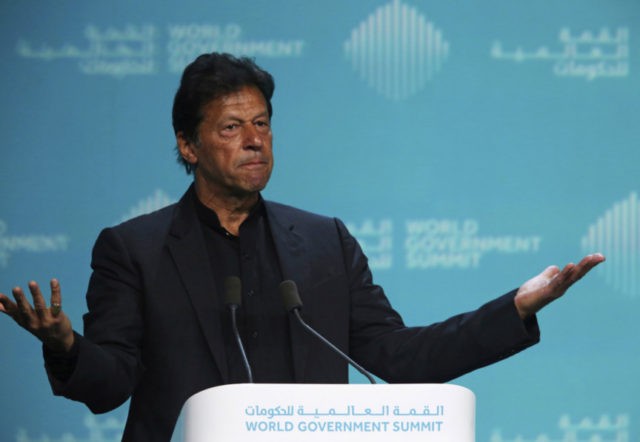Pakistan confirmed on Thursday that it would host the next round of peace talks between the Afghan Taliban and the United States on February 18 as part of efforts by U.S. President Donald Trump’s administration to end the more than 17-year-old war with a political settlement.
Taliban narco-jihadis also confirmed the upcoming meeting, saying the group is expected to meet with Pakistani Prime Minister Imran Khan.
The U.S. Department of State (DOS), however, reportedly said the Trump administration had not received any formal invitation to talks in Islamabad.
“While we have noted the Taliban’s public announcement, we have not received a formal invitation to any talks,” a State Department spokesperson said, Radi Free Europe/Radio Liberty (RFE/RL) reports.
U.S. Special Representative for Afghan Reconciliation Zalmay Khalilzad is leading the intensified peace-seeking efforts on behalf of the Trump administration.
Fawad Chaudhry, the information minister in Pakistan, confirmed that the meeting would take place in Islamabad, without elaborating further, according to Reuters.
News of the negotiations in Islamabad come a week ahead of previously scheduled talks between the two sides in Qatar on February 25, which Zabihullah Mujahid, a Taliban spokesman, said are still on.
In a statement issued Wednesday, the Taliban spokesman declared:
As the negotiations process continues to take place between the Islamic Emirate [Taliban] and [the] United States and meetings have already been held in Qatar and the United Arab Emirates, the next round will resume on the 25th of February 2019 in the Qatari capital of Doha as per agreement reached during the previous meeting.
Similarly, by the formal invitation of the government of Pakistan another meeting is scheduled to take place between the negotiation teams of Islamic Emirate and United States on 18th of February 2019 in Islamabad where the negotiation team of Islamic Emirate will also meet with the Pakistani Prime Minister Imran Khan to hold comprehensive discussions about Pak-Afghan relations and issues pertaining to Afghan refugees and Afghan businessmen.
The Pentagon has long accused Pakistan of harboring the Afghan Taliban, a claim Islamabad denies. Pakistani officials, however, have admitted to having a degree of influence over the group.
Pakistan, Saudi Arabia, and the United Arab Emirates are the only countries that officially recognized the Taliban regime during its five years (1996 to 2001) of oppressive rule in Afghanistan and are believed to have significant influence over the group.
While the U.S. military and intelligence community believe Pakistan continues to serve as a haven for terrorist groups, Khalilzad acknowledged last week Islamabad’s “positive” role, saying the country “has tried to facilitate talks between the Taliban and the U.S. and also favors intra-Afghan dialogue, including between the Taliban and the government [in Kabul].”
President Trump reached out to PM Khan for assistance in convincing the Taliban to join a reconciliation agreement with Kabul, the primary goal of the current U.S. administration’s strategy to end the war in Afghanistan — raging since October 2001 at a tremendous blood and treasure cost to America of nearly $1 trillion dollars, 2,278 U.S. military fatalities, and 20,426 injuries.
Pakistan has taken credit for arranging at least one of the meetings between the Taliban and the United States.
One of the top points of contention between the two sides is the Taliban’s reluctance to allow the Afghan government to participate in the talks, which the United States insists must be Kabul led and owned.
In their last meeting held in the Qatari capital of Doha last month, the Taliban and the United States agreed on a framework mainly for a possible U.S. troop withdrawal in exchange for assurances from the terrorist group that it will not allow other jihadis to plan or conduct attacks against American interests from Afghanistan.
Echoing CIA Director Gina Haspel during his State of the Union address, President Trump indicated that he is planning to leave behind a residual force to ensure the Taliban keeps its promise, a proposal that was rejected by the terrorist group.
Taliban narco-jihadis have long insisted that all troops must leave the country before it agrees to a peace deal.
The Pentagon has said in recent days that it has not received any orders to pull out any of the 14,000 American troops deployed to Afghanistan.
Speaking at NATO headquarters in Belgium on Thursday, U.S. Defense Secretary Patrick Shanahan said, “There will be no unilateral troop reduction” in Afghanistan.
Echoing the U.S. military last week, Khalilzad warned it was too early in the peace process to draw any conclusions.
“Nothing is agreed until everything has been agreed to. … The Afghans must sit across the table with each other and come to an agreement about the future of their country,” the U.S. envoy stressed.

COMMENTS
Please let us know if you're having issues with commenting.